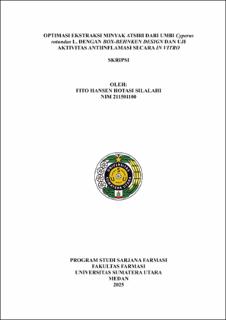| dc.contributor.advisor | Masfria | |
| dc.contributor.advisor | Syahputra, Hafid | |
| dc.contributor.author | Silalahi, Fito Hansen Hotasi | |
| dc.date.accessioned | 2025-04-14T01:28:17Z | |
| dc.date.available | 2025-04-14T01:28:17Z | |
| dc.date.issued | 2025 | |
| dc.identifier.uri | https://repositori.usu.ac.id/handle/123456789/102908 | |
| dc.description.abstract | Background: Inflammation is the body's physiological response to injury or infection that can be addressed with natural anti-inflammatory compounds, such as essential oil from teapot grass (Cyperus rotundus L.) which is rich in terpenoids. To obtain optimal results, essential oil extraction was optimized using Box-Behnken Design, then tested for anti-inflammatory activity through the protein denaturation inhibition method.
Objective: This study aims to determine the optimum conditions for extracting essential oil from teki grass bulbs and to determine the effect of optimization results on protein denaturation inhibition.
Methods: The extraction process was carried out using the Microwave-Assisted Hydrodistillation method with a Stahl circuit, and optimization of extraction conditions using Response Surface Methodology with a Box-Behnken Design model. The regulated variables include microwave power, solvent-material ratio, and extraction time. The optimized responses were essential oil yield and total terpenoid content, which were measured using a UV-Vis spectrophotometer. Anti-inflammatory activity was tested in vitro through the protein denaturation method.
Results: Optimization of essential oil extraction from Cyperus rotundus tubers using the MAHD method produced the best conditions at 600 W power, a solvent-to-material ratio of 1:7.0457, and an extraction time of 51.1356 minutes. The essential oil exhibited moderate anti-inflammatory activity with an IC50 of 109.1826 ± 0.4225 μg/mL, while the positive controls, diclofenac sodium and ibuprofen, showed strong activity with IC50 values of 9.1399 ± 0.0651 μg/mL and 36.8790 ± 0.3562 μg/mL.
Conclusion: Extraction optimization with BBD modeling was conducted to obtain the highest essential oil yield and terpenoid content under certain conditions and after testing the activity of the with certain conditions and after testing the anti-inflammatory activity anti-inflammatory activity testing, it was found that the compound from the essential oil of Cyperus rotundus L. has pharmacological potential as anti-inflammatory through the method of inhibition of protein denaturation with moderate category activity. | en_US |
| dc.language.iso | id | en_US |
| dc.publisher | Universitas Sumatera Utara | en_US |
| dc.subject | Cyperus rotundus L. | en_US |
| dc.subject | Box-Behnken Design | en_US |
| dc.subject | Microwave-assisted Hydrodistillation | en_US |
| dc.subject | essential oils | en_US |
| dc.subject | Protein denaturation inhibition | en_US |
| dc.title | Optimasi Ekstraksi Minyak Atsiri dari Umbi Cyperus Rotundus L. dengan Box-Behnken Design dan Uji Aktivitas Antiinflamasi secara In Vitro | en_US |
| dc.title.alternative | Optimization on Essential Oil Extraction from Tuber of Cyperus Rotundus L. with Box-Behnken Design and In Vitro Antiinflammatory Assay | en_US |
| dc.type | Thesis | en_US |
| dc.identifier.nim | NIM211501100 | |
| dc.identifier.nidn | NIDN0023075705 | |
| dc.identifier.nidn | NIDN0020109501 | |
| dc.identifier.kodeprodi | KODEPRODI48201#Farmasi | |
| dc.description.pages | 180 Pages | en_US |
| dc.description.type | Skripsi Sarjana | en_US |
| dc.subject.sdgs | SDGs 4. Quality Education | en_US |


